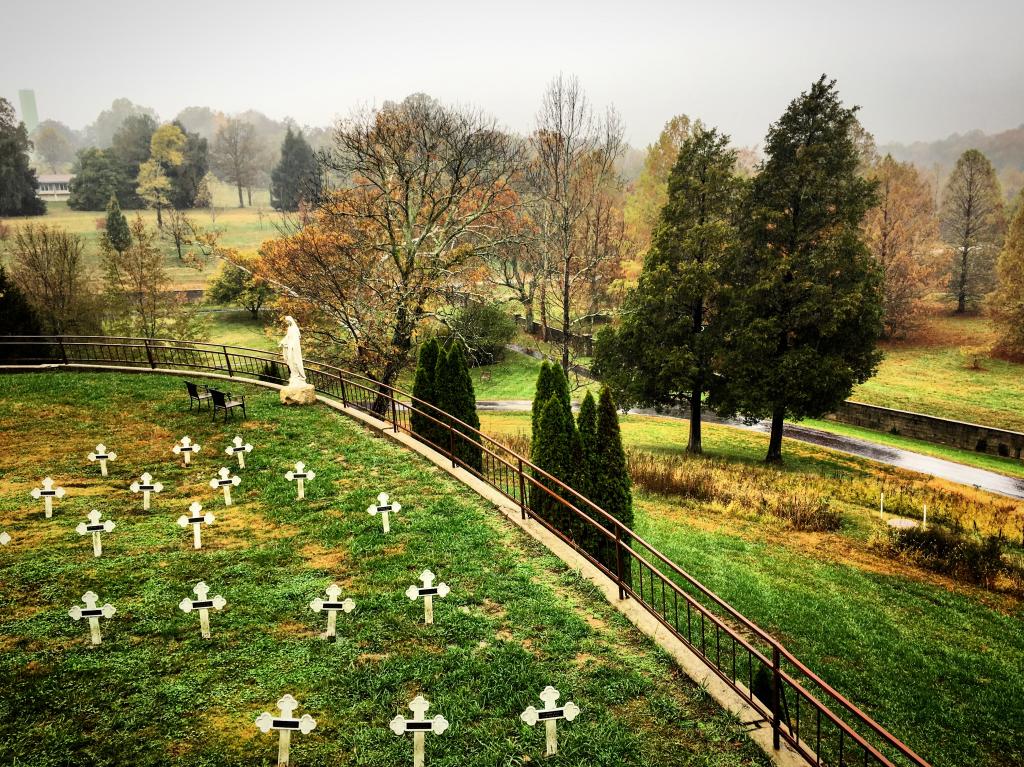When I heard about the terrorist attack in San Bernardino, I was dismayed to learn that not only where there two attackers, but one of them was female, and that both were apparently loyal, but not necessarily sent by, ISIS. After the attacks in Paris, I felt critical of the lack of coverage of other places affected by terrorism, such as the 150 students and others killed in Kenya earlier this year, or the 25 or so that were just killed in Chad by suicide bombings. The vast majority of those who suffer and die at the hands of Islamists have been other Muslims, but now the families and friends of yet another 14 people are mourning. Asking impossible questions, and praying impossible prayers.
In the monastery where I am staying, the monks pray the Psalms every day through chant. I love chanting the Psalms because they express the raw beauty of human fragility. Marking the times of the day, and the days of the season with prayer is one of the many beautiful aspects of monasticism. There are a few however—sometimes called the malediction Psalms—that are quite disturbing (and it is fascinating to watch peaceful monks chant them). A day or so after the San Bernardino attack, we chanted Psalms 44 during our 5:30 am Vigils:
‘…Through you we push down our foes;
Through your name we tread down our assailants…’
In light of the recent attacks, I could see footage of triumphant ISIS fighters cocking rifles and rocket launchers in the air. Invoking Allah as they sent missiles into another city. I was reminded however, that whether we are talking about the conquest of Palestine by Joshua, the sacking of Constantinople by Christian Crusaders, or the Pope proclaiming the Western Hemisphere to be Terra Nullis, Islamists are not alone in having invoked God to push others out of their places, having imposed a brutal version of their sacred texts on others, or massacred innocent civilians in the name of God.
Judaism and Christianity have reformed we say. Why can’t all Muslims interpret their scriptures in a similar way? At the Parliament of the World’s Religions this year, Karen Armstrong gave a talk about interpreting problematic scriptures. She stated that even our most violent and disturbing passages have a long tradition of being interpreted allegorically. We can apply scriptures about conquest to our own hearts, to our own spirits. Camaldoli monk Robert Hale writes that the Psalms “turn every human yearning into prayer.”[1] For Hale, problematic Psalms can be interpreted spiritually. In the secular West, this method of interpretation frees us of problematic scriptures that might violate our accustomed divisions between Church and State, Facts and Values, Body and Soul. ISIS’s heresy is not only that they are bad Muslims murdering innocent people in the name of an uncompromising ideology, but that they are doing it from the wrong side of the dualism. Can’t they preach sermons of peace on Sundays and send in drone strikes on Monday like the rest of us!?
Having never lost a family member or close friend to war, I cannot imagine this kind of loss. But this is why the Psalms have endured as a backbone of spiritual practice. They capture the rich spectrum of human experience. I imagine that the survivors of these most recent attacks might see Psalm 137:8-9 in a new light:
‘…O daughter Babylon (or, ISIS), you devastator!
Happy shall they be who pay you back what you have done to us!
Happy shall they be who take your little ones and dash them against the rock!’
One can hear the pounding fists of the mourning from a conquered Juda seeking vengeance from God (#prayforJuda). It is easy to see that after the invasions of Iraq and Afghanistan, many there could also relate to this Psalm. Or, after 9/11, or after Paris; or hear them in the words of Presbyterian Donald Trump threatening the families of ISIS; or see them on the faces of the families of the innocent civilians slain in airstrikes happening right now in Syria. Yes, the Psalms capture the entire range of human emotion, from ecstatic joy to despairing loneliness, from hot-blooded vengeance to touching tenderness and forgiveness; but in the 5th and 6th centuries BCE Israel, as now, these were flesh and blood laments, fed by the real sorrow of a defeated people. One does not wish for the death, or infanticide or still birth of the enemies of one’s soul; but only for those who have taken everything from you.
It is easy for me to interpret the Psalms spiritually, but if I had lost a friend or family member in San Bernardino, or in Bagdad, or in Damascus, or in Chad, perhaps I too would be praying for strength to carry out vengeance. For Christians and others to criticize ISIS for a selective and toxic reading of their sacred text and tradition in the name of Allah, is to selectively forget the toxicity of our own conquests and zealotry in the name of Jesus, and to dualize the real pain that comes from loss. The Psalms do not justify vengeance, but only document our desire for it. So rather than insisting that we interpret the Psalms allegorically or spiritually, perhaps we should interpret them empathically. Maybe then, as we comfort those who mourn can we muster the strength to seek forgiveness and reconciliation rather than vengeance.
[1] Robert Hale, 1999, Love on the Mountain: The Chronicles Journal of a Camaldolese Monk (Trabuco Canyon, CA: Source Books and Hermitage Books), pp. 36.












